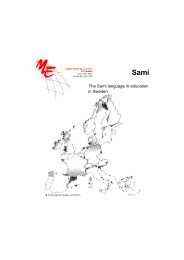Multilingual Early Language Transmission (MELT) - Mercator ...
Multilingual Early Language Transmission (MELT) - Mercator ...
Multilingual Early Language Transmission (MELT) - Mercator ...
Create successful ePaper yourself
Turn your PDF publications into a flip-book with our unique Google optimized e-Paper software.
3.3 Definition of <strong>Multilingual</strong> <strong>Early</strong> <strong>Language</strong> <strong>Transmission</strong><br />
Using the knowledge and descriptions of the definitions in the above sections we will<br />
formulate a definition of multilingual early language transmission (<strong>MELT</strong>) in this section.<br />
Below we will first present the definition of <strong>MELT</strong> as it is used in the project and in this<br />
paper. In the sections after that and in the next chapters we will clarify some terms and<br />
theoretical concepts further.<br />
The early years (age 0-4) are an advantageous time to acquire language skills. One of the<br />
skills young children need to acquire is to understand the adults in their environment,<br />
whatever language(s) they speak to the child. At the same time the child learns to speak and<br />
acquires the language(s) in its own time and in a playful, natural way.<br />
<strong>Language</strong> acquisition can take place simultaneously in several languages (in the <strong>MELT</strong> project<br />
the minority and the majority languages) or just only in the minority language. The<br />
promotion and stimulation of (regional or) minority (and less widely used languages) from an<br />
early age is crucial for (the overall development of) the child, to wit its becoming a<br />
continuous multilingual person, particularly in an age of ever-increasing globalisation. The<br />
<strong>MELT</strong> project explicitly stresses that it is important to learn the minority language at an early<br />
age. Due to its high social status the majority language, will develop automatically through<br />
primary school, television, other media etc.<br />
<strong>Language</strong> is not merely a tool of communication but also a value. Mother tongue and father<br />
tongue are of equal value to the child. And the minority language should gain equal value to<br />
the majority language in the eyes of pre-school teachers, parents, other care takers and<br />
policymakers. <strong>Early</strong>-years practitioners work within the pre-school institutions with a<br />
conscious language policy and offer children a language rich environment. Pre-school staff<br />
are aware of language immersion methodology in the minority language. Learning a<br />
language relies on the development of operations: these operations are influenced and<br />
modulated by both verbal and non-verbal interactions (led by adults) with the child’s<br />
environment.<br />
For their children to grow up as a balanced and long-term multilingual, bilingual, or<br />
plurilingual person, parents need advice and guidance on how to raise their children as<br />
balanced multilinguals, especially if only one parent speaks the minority language and the<br />
other speaks the majority language. When parents raising their children multilingual they<br />
must be aware of the benefits of multilingualism, they have a positive attitude, and they are<br />
not afraid to speak the minority language to their children.<br />
53



